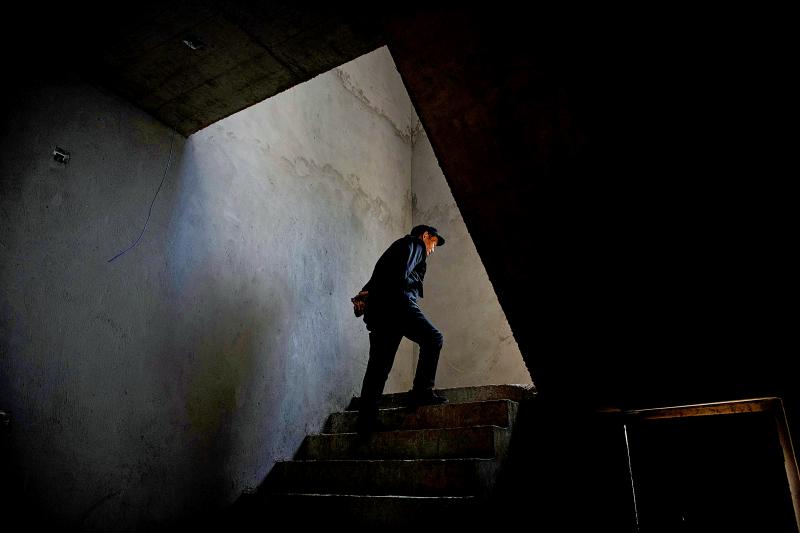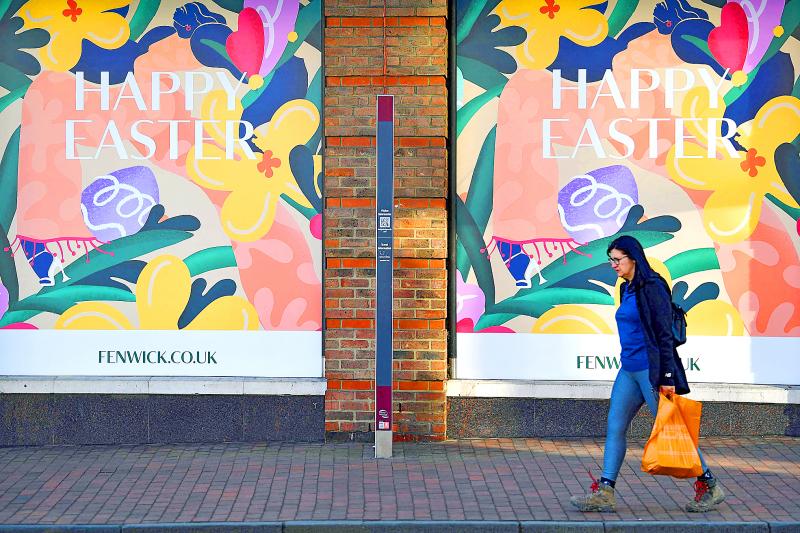You don’t have to be grunting in a gym or grinding out the laps of the park to get a sweat on. Incidental exercise can be just as beneficial, and much easier to incorporate into daily routines.
“It’s any activity that is part of daily living,” says Prof Emmanuel Stamatakis, an expert in physical activity at the University of Sydney, “rather than something that is done for the purpose of fitness, health or entertainment.”
Stamatakis says that incidental exercise, which is termed “intermittent lifestyle physical activity” by academics, is under-researched. But a paper he co-authored in 2018 found that sudden bursts of high-intensity incidental exercise — bounding up a flight of stairs, for example — could be highly beneficial from a health point of view, undermining the long-held belief that physical activity has to last at least 10 minutes to be worthwhile.

Photo: AFP
“All physical activity counts and has a health benefit,” says Stamatakis.
But how best to incorporate more incidental exercise to your life? The experts weigh in.
RISE AND TENSE

Photo: AFP
“The glute bridge is the No 1 exercise I recommend for people in the morning before they get out of bed,” says the personal trainer Shelly Davies. “Wake up, stretch and do a glute bridge.”
To perform a glute bridge, lie on your back with your knees bent, feet flat on the floor or bed and lift your knees, hips and shoulders off the floor, while squeezing the muscles in your bum.
Davies specializes in training people over 60, and, with the help of morning glute-bridges, she has helped them rebuild their core strength.
“I have a 93-year-old client who does three glute bridges in the morning before she gets out of bed,” Davies says. “She used to have to use an aide to help her up. Now, she can sit up and roll out of bed herself.”
CHORES ARE YOUR FRIEND
“You’d be surprised by how much energy you burn off doing household chores,” says Nicole Booth, a personal trainer and lecturer at Lancaster University. “Simple things like weeding in the garden or spring-cleaning are great ways to get active. Plus, getting up and moving around can help alleviate chronic back pain.”
THINK LIKE A CAT
Ever noticed how your cat stretches itself out after a nap? Be more like a cat.
“People forget it’s important to stretch every day, too,” says Booth. “Animals instinctively do this when they wake, but as humans we have forgotten or pushed this to one side. A minute of stretching to prevent tightness can help us focus how we are feeling physically and plan out our day. It doesn’t have to be a yoga sequence or specific format.”
HARD AND FAST IS BETTER
“Not all physical activity is the same,” says Stamatakis. “Intensity is important.”
A gentle stroll to the corner shop will not do much long-term for your fitness; however, if you decide you’re going to walk there as fast as possible, then you’re racking up your high-intensity incidental exercise quota.
“Try to get out of breath for a few minutes,” says Stamatakis, “then go back to a normal walking place.”
“Replace car trips with walking and cycling,” says Stamatakis. “For most people, it’s perfectly achievable to walk or cycle for a short journey of one-two miles.”
DITCH THE LIFT
“Stairs will often take less time than using lifts,” says Stamatakis. “And it’s fantastic high intensity exercise that can cause measurable improvements in the cardiorespiratory system for most people.” Plus, stairs are more COVIC-friendly; who wants to be in an enclosed space with strangers?
“If you’re brushing your teeth in the evening,” says Davies, “why not do some squats while you’re at it?”
For her older clients, Davies suggests sit-to-stands: that’s sitting down then standing up before eating a meal.
“Make sure you squeeze your bum when you do stand up,” she says.
When waiting for a kettle to boil, Davies encourages her older clients to work on their balance.
“By standing on one leg for 30 seconds at a time while waiting for a kettle to boil, you’re strengthening your core,” she says.
There’s plenty you can do while cuing up yet another Netflix series.
“I have a client who’s 86 and has problems with her feet,” says Davies. “I tell her to pick up marbles with her toes when watching TV, to strengthen her feet.”
Don’t sit at home on your backside all day.
“If you’re sitting at home watching TV,” says Booth, “get up in between episodes and walk around. Set a target to do mini-tasks. Fill a small glass of water, have a little dance with the children.”
Above all, move. “Exercise doesn’t have to be all or nothing,” says Booth. “Anything you can do is progress.”
So, get moving. You don’t even have to leave your house — or turn off the TV.

May 18 to May 24 Pastor Yang Hsu’s (楊煦) congregation was shocked upon seeing the land he chose to build his orphanage. It was surrounded by mountains on three sides, and the only way to access it was to cross a river by foot. The soil was poor due to runoff, and large rocks strewn across the plot prevented much from growing. In addition, there was no running water or electricity. But it was all Yang could afford. He and his Indigenous Atayal wife Lin Feng-ying (林鳳英) had already been caring for 24 orphans in their home, and they were in

On May 2, Chinese Nationalist Party (KMT) Chairman Eric Chu (朱立倫), at a meeting in support of Taipei city councilors at party headquarters, compared President William Lai (賴清德) to Hitler. Chu claimed that unlike any other democracy worldwide in history, no other leader was rooting out opposing parties like Lai and the Democratic Progressive Party (DPP). That his statements are wildly inaccurate was not the point. It was a rallying cry, not a history lesson. This was intentional to provoke the international diplomatic community into a response, which was promptly provided. Both the German and Israeli offices issued statements on Facebook

Even by the standards of Ukraine’s International Legion, which comprises volunteers from over 55 countries, Han has an unusual backstory. Born in Taichung, he grew up in Costa Rica — then one of Taiwan’s diplomatic allies — where a relative worked for the embassy. After attending an American international high school in San Jose, Costa Rica’s capital, Han — who prefers to use only his given name for OPSEC (operations security) reasons — moved to the US in his teens. He attended Penn State University before returning to Taiwan to work in the semiconductor industry in Kaohsiung, where he

Australia’s ABC last week published a piece on the recall campaign. The article emphasized the divisions in Taiwanese society and blamed the recall for worsening them. It quotes a supporter of the Taiwan People’s Party (TPP) as saying “I’m 43 years old, born and raised here, and I’ve never seen the country this divided in my entire life.” Apparently, as an adult, she slept through the post-election violence in 2000 and 2004 by the Chinese Nationalist Party (KMT), the veiled coup threats by the military when Chen Shui-bian (陳水扁) became president, the 2006 Red Shirt protests against him ginned up by